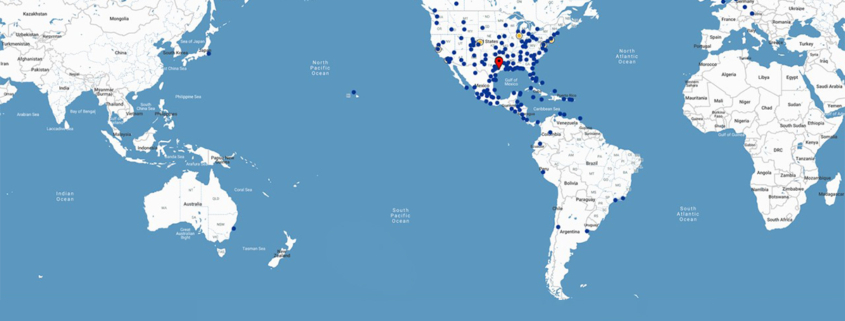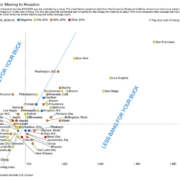A New Strategy for Securing Houston’s Economic Future
Talk has been growing in recent years about Houston’s economic future in a less carbon-intensive energy world. Will we still be the world’s energy capital in the coming decades, and what does that mean? The Greater Houston Partnership and Center for Houston’s Future have taken the lead on this challenge with their Energy 2.0 and energy transition work, and I hope they’re getting traction with it (despite pandemic distractions). We certainly have a lot of expertise here that can work on big problems like carbon capture with the right economic incentives.
Another strategy is growing our innovation and startup ecosystem to build the companies of tomorrow – especially in energy, space, and biotech – and I think there has been great progress made in recent years, including Rice’s building of the Ion in Midtown. One area that has not been as successful is trying to attract tech companies building new offices. To be brutally honest, we can’t out-Austin Austin.
The energy transition and innovation ecosystem are both great initiatives to help secure Houston’s economic future, but I think there’s a third opportunity we’re overlooking. It plays perfectly to our strengths:
- America’s most affordable global city (vs. NYC, LA, Chicago, SF, Miami)
- Being more attractive to global migrants than domestic ones (which seem to be more interested in places like Austin, Denver, and Nashville)
- Large expat communities from countries all over the world
- 92 foreign consular offices, the third-largest set in the US after NYC and LA
- One of the largest ports in the country
- A friendly and welcoming local culture
- A huge United hub at IAH with nonstops covering all of the Americas in addition to European, Asian, Middle Eastern, and ANZ connections.Put all those strengths together and what’s the opportunity? To be the location of choice for foreign companies establishing their branch office for the Americas. There are thousands of fast-growing companies around the world that will need to establish a presence in the Americas at some point, and Houston is really the ideal place for them to put it for all the reasons listed above.
I think we already compete for these to some extent, but there’s an opportunity to do it much more aggressively with a formal, well-funded program that cooperates closely with all our foreign consulates to identify their up-and-coming companies and start wooing them as early as possible. Without outside influence, they probably tend to end up in the cities that are more obvious and well-known to them like NYC, LA, and Miami. But if we intervene early and show them how much better Houston will ultimately be for both their business and their employees, I think we can win over a substantial number of them. Their expat employees used to small flats and public transport in crowded cities will be blown away by the equivalent home and car they can buy in Houston, Sugar Land, or The Woodlands!
These foreign branch offices aren’t as sexy as green energy, tech, or entrepreneurial startups, but over time they could provide a very strong foundational component to Houston’s economy with a whole lot less uncertainty and volatility. Even better, we won’t have that much competition – it’s an opportunity ignored by most cities as they chase the hot tech companies and try to cultivate their own startup scenes. Foreign corporate offices should definitely be the third strategy to secure Houston’s economic future in a world increasingly hostile to oil and gas.
This piece first appeared on Houston Strategies Blogspot.
Tory Gattis is a Founding Senior Fellow with the Center for Opportunity Urbanism and co-authored the original study with noted urbanist Joel Kotkin and others, creating a city philosophy around upward social mobility for all citizens as an alternative to the popular smart growth, new urbanism, and creative class movements. He is also an editor of the Houston Strategies blog.









